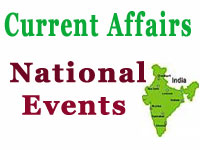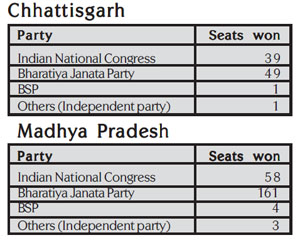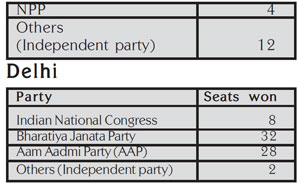(Current Affairs) National Events | February: 2014

National Events
-
Lokpal and Lokayukta Bill, 2013 Passed (Free Available)
-
Assembly Elections 2013 Results (Free Available)
-
ICAO Accreditation and Membership received by AAI (Only for Online Coaching Members)
-
Harsher punishment for milk adulterators favoured by SC (Only for Online Coaching Members)
-
The Food Safety and Standards Authority of India (FSSAI) (Only for Online Coaching Members)
-
CBI’s Legal wing now under control of agency’s Director (Only for Online Coaching Members)
-
Government sanction not Required to Probe Public Servants (Only for Online Coaching Members)
-
NSSO data showed that Urban life quality improved by JNNURM (Only for Online Coaching Members)
-
150 stretches of river identified as polluted by CPCB (Only for Online Coaching Members)
-
Quadricycle added as new Vehicle category (Only for Online Coaching Members)
-
The Prevention of Communal Violence Bill 2013 approved (Only for Online Coaching Members)
-
National Cancer Institute at Jhajjar AIIMS campus (Only for Online Coaching Members)
-
AAP recognised as State Party in Delhi (Only for Online Coaching Members)
-
Prohibition of Employment as Manual Scavengers and their Rehabilitation Act, 2013 (Only for Online Coaching Members)
-
CCSD approved National Skills Qualifications Framework (Only for Online Coaching Members)
-
Three Proposals to utilise Nirbhaya Fund approved (Only for Online Coaching Members)
-
Continuation of NSWF approved in the 12th Plan (Only for Online Coaching Members)
-
Union Cabinet approved Telangana draft Bill (Only for Online Coaching Members)
-
Rights of Persons with Disabilities Bill, 2011 approved (Only for Online Coaching Members)
-
Dabhol-Bangalore Natural Gas Pipeline dedicated to Nation (Only for Online Coaching Members)
-
Red Beacons are allowed for Constitutional posts and high dignitaries (Only for Online Coaching Members)
-
‘Express Parcel’ and ‘Business Parcel’ Services Launched (Only for Online Coaching Members)
-
The Code of Conduct for Ministers revised (Only for Online Coaching Members)
-
SC ordered to make 22 CBI courts functional across India (Only for Online Coaching Members)
-
Constitutional Status to Judicial Appointments Commission (Only for Online Coaching Members)
-
Panchayati Raj Ministry proposal on BRGF approved by CCEA (Only for Online Coaching Members)
-
Survey on drinking water, sanitation and hygiene by NSSO (Only for Online Coaching Members)
-
Supreme Court ruled Homosexuality is offence (Only for Online Coaching Members)
Lokpal and Lokayukta Bill, 2013 Passed
Lokpal and Lokayukta Bill, 2013 was passed by the Lok Sabha on 18 December 2013. Earlier, the Bill was passed by the Rajya Sabha on 17 December 2013 after some amendments. The Bill seeks to establish an anti-corruption watchdog that will have in its purview even the office of Prime Minister. The Lokpal and Lokayukta Bill, 2013 was passed by voice vote amid the opposition from the members Seemandhra region who were protesting against division of Andhra Pradesh to create Telangana state. During the passage of the Bill, Samajwadi Party members staged a walk out from the Parliament while Shiv Sena Party members voted against the Bill. The passage of the Bill has been welcomed by anticorruption crusader and social activist Anna Hazare. He sat on the fast for the Lokpal Bill passage for the fourth time on 10 December 2013. Among the amendments accepted by the government are delinking of the mandatory creation of lokayuktas by the state governments, one of the provisions which had stalled the passage of the bill in December 2011.
Important features of Lokpal and Lokayukta Bill 2013:
- Lokpal at the Centre and Lokayukta at the States
- The Lokpal consists of a Chairperson and a maximum of eight members of which 50% shall be judicial members
- The Lokpal Chairperson or member shall not be connected with any political party and one member will be an eminent jurist nominated by the President.
- The selection of Chairperson and members of Lokpal shall be through a Selection committee consisting of
- Prime Minister
- Speaker of Lok Sabha
- Leader of Opposition in the Lok Sabha
- Chief Justice of India or sitting Supreme Court judge nominated by CJI
- Eminent jurist to be nominated by the President of India on the basis of recommendations of the four members of the Selection Committee.
- All ministers including Prime Minister with some safeguards and senior public servants are covered by the ombudsman, excluding the public servants under Army, Navy and Coastal guard.
- All entities receiving donations from foreign source in the context of the Foreign Contribution Regulation Act (FCRA) in excess of 10 lakh rupees per year are brought under the jurisdiction of Lokpal.
- Provides adequate protection for honest and upright Public Servants..
- Lokpal will have power of superintendence and direction over any investigation agency including CBI for cases referred to them by Lokpal.
- A high powered Committee chaired by the Prime Minister will recommend selection of the Director, CBI.
- Directorate of Prosecution headed by a Director of Prosecution under the overall control of Director
- The appointment of the Director of Prosecution, CBI will be made on the recommendation of the Central Vigilance Commission.
- Transfer of officers of CBI investigating cases referred by Lokpal with the approval of Lokpal.
- The Bill also incorporates provisions for attachment and confiscation of property acquired by corrupt means, even while prosecution is pending.
- The Bill lays down clear time lines for Preliminary enquiry & investigation and trial and towards this end, the Bill provides for setting up of Special Courts.
- A mandate for setting up of the institution of Lokayukta through enactment of a law by the State Legislature within a period of 365 days from the date of commencement of the Act.
A Brief History
The term Lokpal is an Indian version of the Swedish term Ombudsman. The institution of Ombudsman was first established in Sweden in 1808.
In India, the term Lokpal was first used by the then Prime Minister Jawahar Lal Nehru in 1963 and in 1966 a Lokpal for the Centre and Lokayukta for each State were proposed.
Lokpal and Lokayukta Bill was first introduced in the Fourth Lok Sabha in 1968 .
The Bill was re-introduced in 1971, 1977, 1985, 1989, 1996, 1998, 2001 and 2011 but was never passed.
Assembly Elections 2013 Results
Bharatiya Janata Party (BJP) on 8 December 2013 won the state
assembly election in Madhya Pradesh, Rajasthan and Chhattisgarh. In Delhi
assembly elections BJP emerged as the largest party and Aam Aadmi Party
(AAP) in its debut emerged as the second largest party pushing the ruling party
Congress as the third party. In Chhattisgarh, BJP won 49 seats and the
opposition party Congress won 39 seats. In Madhya Pradesh the party won 161
seats, whereas the main opposition party Congress was able to secure 58 seats.
In Rajasthan, BJP won on 162 seats by reducing the ruling party Congress
government to 21 seats only.
Total Seats in Madhya Pradesh – 230
Total Seats in Rajasthan – 199
Total Seats in Delhi – 70
Results of the Assembly elections 2013 of the four states are Chhattisgarh



e-inclusion Project Launched
The Union Government on 24 December 2013 launched einclusion project to make people eliterate. The project is an initiative to make at least one individual in every household e-literate. Union minister of Communications and Information Technology, Kapil Sibal also launched the book on e-inclusion after launching e-inclusion and eliteracy through Common Services Centres in New Delhi. IT training will be provided to the economically weaker sections of the society including rural SC, ST and women under this project. The project will help people to participate in the knowledge based activities and access the financial, social and government services by the use of internet.

